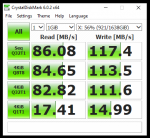n8lbv
Explorer
- Joined
- Sep 12, 2017
- Messages
- 58
Hi,
I'm still brand new to Freenas and this is NOT a production system.
It's just for testing and learning on.
Actually quite pleased with the performance speed for just testing.
1GB isolated test LAN, write speed is on par with the actual write speed of the magnetic drive.
Read is slower and I am curious why.
During read/write test,
RAM and CPU usage on the dashboard look relatively low. nothing is being maxed out.
Anyhow trying to get a better understanding of the system and what would typically cause read speed to be down compared to write speed
When I am quite used to the opposite being the case.
Dell Optiplex 390 *Latest Motherboard Firmware installed.
Service TAG: 8TX38V1
CPU Gen2 i5
RAM 8GB DDR3
test pool: Two WD Black WD1003FZEX in a stripe.
Using built on motherboard Intel SATA ports
FreeNAS-11.2-U5
I'm still brand new to Freenas and this is NOT a production system.
It's just for testing and learning on.
Actually quite pleased with the performance speed for just testing.
1GB isolated test LAN, write speed is on par with the actual write speed of the magnetic drive.
Read is slower and I am curious why.
During read/write test,
RAM and CPU usage on the dashboard look relatively low. nothing is being maxed out.
Anyhow trying to get a better understanding of the system and what would typically cause read speed to be down compared to write speed
When I am quite used to the opposite being the case.
Dell Optiplex 390 *Latest Motherboard Firmware installed.
Service TAG: 8TX38V1
CPU Gen2 i5
RAM 8GB DDR3
test pool: Two WD Black WD1003FZEX in a stripe.
Using built on motherboard Intel SATA ports
FreeNAS-11.2-U5

